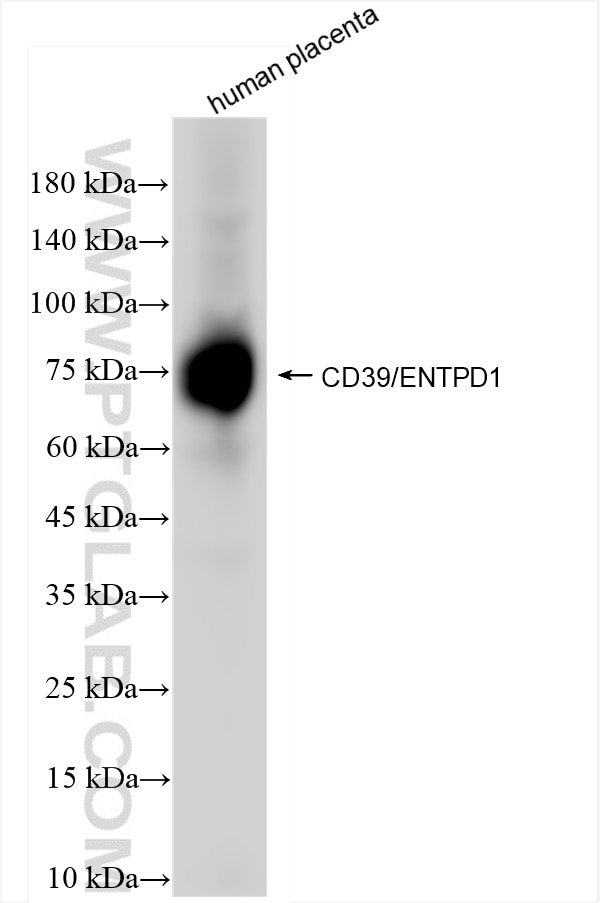Tested Applications
| Positive WB detected in | human placenta tissue |
Recommended dilution
| Application | Dilution |
|---|---|
| Western Blot (WB) | WB : 1:5000-1:50000 |
| It is recommended that this reagent should be titrated in each testing system to obtain optimal results. | |
| Sample-dependent, Check data in validation data gallery. | |
Product Information
84235-4-RR targets ENTPD1 in WB, ELISA applications and shows reactivity with human samples.
| Tested Reactivity | human |
| Host / Isotype | Rabbit / IgG |
| Class | Recombinant |
| Type | Antibody |
| Immunogen | Recombinant Protein Predict reactive species |
| Full Name | ectonucleoside triphosphate diphosphohydrolase 1 |
| Calculated Molecular Weight | 58 kDa |
| Observed Molecular Weight | 75 kDa |
| GenBank Accession Number | BC047664 |
| Gene Symbol | CD39 |
| Gene ID (NCBI) | 953 |
| RRID | AB_3671788 |
| Conjugate | Unconjugated |
| Form | Liquid |
| Purification Method | Protein A purfication |
| UNIPROT ID | P49961 |
| Storage Buffer | PBS with 0.02% sodium azide and 50% glycerol pH 7.3. |
| Storage Conditions | Store at -20°C. Stable for one year after shipment. Aliquoting is unnecessary for -20oC storage. 20ul sizes contain 0.1% BSA. |
Background Information
ENTPD1(Ectonucleoside triphosphate diphosphohydrolase 1) is also named CD39, NTPDase 1, and Ecto-ATPDase 1 and belongs to the GDA1/CD39 NTPase family. In the nervous system, it can hydrolyze ATP and other nucleotides to regulate purinergic neurotransmission. It is a noncovalent tetrameric protein and detergent inhibition of enzymatic activity is caused by dissociation of ectoapyrase tetramers into monomers(PMID: 9733785 ). And it is a 70- to 100-kDa protein that is heavily N-glycosylated(PMID:7930580). This protein has 6 glycosylation sites and 3 isoforms(58 kDa, 59 kDa, and 34 kDa) produced by alternative splicing.
Protocols
| Product Specific Protocols | |
|---|---|
| WB protocol for ENTPD1 antibody 84235-4-RR | Download protocol |
| Standard Protocols | |
|---|---|
| Click here to view our Standard Protocols |



